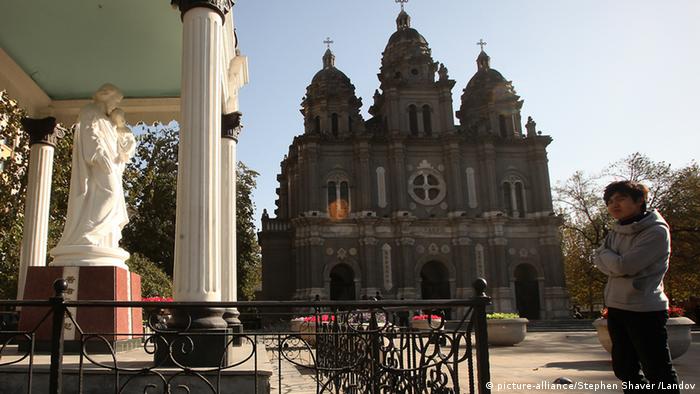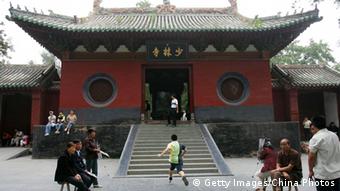Christians in Zhejiang Province have accused the authorities of seeking to rein in the influence of Christianity after local churches were ordered to take down their crosses. DW spoke to China sociologist Fenggang Yang.
Authorities in southeastern Zhejiang province are believed to be under a deadline to remove crosses from the spires, vaults, roofs and wall arches of the 4,000 or so churches in the region, Associated Press reported.

Communist China officially guarantees freedom of religion though authorities are sometimes suspicious of religious groups. The state-run Global Times newspaper said in July authorities in Zhejiang denied demolishing crosses on churches, but had said some crosses had been “relocated” out of safety concerns.
In a DW interview, Fenggang Yang, Director of the Center on Religion and Chinese Society at Purdue University, speaks not only about the possible reasons behind the campaign, but also about its legality and impact on China’s growing Christian population.
DW: Why have provincial authorities decided to take down church crosses?
Fenggang Yang: The Zhejiang authorities have carried out this campaign in the name of “san gai yi chai (3 modifications and 1 demolishing),” which was publicly launched on February 21, 2013. The 3+1 campaign is posited as aiming to demolish illegal constructions and make appearance improvement in areas of old residences, old factories, and villages that have merged into cities.
However, an internal government document issued in 2013 clearly shows that the real target of the campaign is Christian churches and the purpose is to reduce Christianity’s public profile.
The campaign document states, in no uncertain terms, that: “The priority is to remove crosses at religious activity sites on both sides of expressways, national highways and provincial highways. Over time and in batches, bring down the crosses from the rooftops to the façade of the buildings.” Since the launch of the campaign, its execution has persisted in spite of resistance and opposition.
Who ordered this move and how likely is it that it is linked to Chinese President Xi Jinping?
The 3+1 campaign has been carried out in the Province of Zhejiang. There are rumors that the Zhejiang Communist Party boss Xia Baolong has a strong personal distaste for the crosses on top of churches, which have become visible on the sides of highways and throughout the cities of Wenzhou, Hangzhou and others.
The order to demolish churches and remove crosses from church rooftops is clearly from Xia Baolong. For a while, I thought that this could be a political gamble of Xia, who might have guessed the preference of Xi Jinping and made this bold campaign in order to win Xi’s favor and get a promotion.
Of course, it is still not clear whether Xi gave the order directly to Xia, or has passively permitted the campaign by the provincial boss, or simply has not had the time to stop it because of dealing with the other more urgent and overwhelming challenges.
Why are these measures being imposed in this province?

What is the Chinese government ultimately seeking to achieve by this?
This is puzzling indeed. First of all, it is a fact that there are more and more Christians in China. The number of Christians in the population is probably approaching – and may have already reached – one hundred million. For the purpose of maintaining social stability, there would be no good reason to antagonize such a large and growing population.
Second, up to today, the Chinese authorities have tried to maintain their control over Christianity in part by using the Three-Self Patriotic Movement Committee and the Christian Council on the Protestant side, and the Catholic Patriotic Association on the Catholic side. However, the Zhejiang Catholic Patriotic Association and the Zhejiang Christian Council issued open opposition letters to the cross demolition campaign on July 5 and 10, respectively.
The authorities then confiscated the official seals of these organizations, practically illegalized them. To some degree, these organizations have served as the bridge between Christians and the authorities, even though they are also perceived by most Christians as the extended control apparatus of the party-state. Now, the leaders of these organizations have stated that the bridge has been burnt or broken.
At the present and in the near future, Christians are not and cannot be a real threat to the political order. Moreover, until now, most Chinese Christians have little interest in politics and try hard to stay away from political participation. They wish to be left alone to evangelize and exercise their faith.
However, the cross demolition campaign may have helped to awaken the political consciousness of Chinese Christians, forcing them to take political action to resist and protest the suppression.
Can the actions by the provincial government be considered illegal?
The measures against the church by Zhejiang government are not justifiable by the existing laws of China. The Zhejiang authorities have cited some rules for the 3+1 campaign, but these are administrative rules or orders.
Communist China officially guarantees freedom of religion though authorities are sometimes suspicious of religious groups
According to some lawyers and legal scholars in China, these rules and orders have been made without following the proper procedure and may have violated some formal laws, which should be made by the People’s Congress instead of any government bureaus.
Moreover, many believers, scholars, and lawyers have argued that the Chinese Constitution guarantees the freedom of religious belief, and the cross demolition campaign has violated the Constitution. Unfortunately, in China, the Constitution cannot be cited in court trials.
Doesn’t communist China officially guarantee freedom of religion?
China allows five religions to operate legally, including Buddhism, Daoism, Islam, Catholicism, and Christianity (Protestantism). In the Constitution and official documents, the five religions are said to be treated equally.
In reality, all religions are strictly regulated and restricted. In recent years, without changing the formal regulations, the official discourse and actual practice of the authorities have tilted toward relaxing restrictions on Buddhism and Daoism and increasing restrictions on Christianity and Islam.
The folk religious beliefs and practices have been suppressed, but in recent years there are measures to revive them in the name of preserving and reviving traditional culture. Some officials and theoreticians have made open calls for using folk religion and traditional religions of Buddhism and Daoism to counterbalance the rapid growth of Christianity.
Do you believe the recent crackdown will succeed or ultimately backfire?
 |
| Yang: ‘The current campaign has helped to awaken the consciousness of Chinese Christians’ |
Historical precedents made me think that it will fail and backfire. The Chinese Communists tried to suppress Christianity before. Beginning in 1966 when the Cultural Revolution broke out, all Christian churches were closed down, along with all other religious sites.
Some historians have documented that half a million Christians died of unnatural deaths by the end of the Cultural Revolution. In 1979, the eradication policy was officially abandoned by the new leadership of the CCP under Deng Xiaoping. By then, the number of Catholics remained about the same as before the Cultural Revolution, three million, and the number of Protestants actually increased from one million to three million.
If they failed then, they will surely fail this time as well. Nowadays, given the changes in social structure, increase in social space, and global connectivity, it is even more difficult for the authorities to suppress Christianity or curtail the increase of Christians. Moreover, the current campaign has helped to awaken the consciousness of Chinese Christians.
They have realized that they have no choice but to be more engaged socially and politically, because trying to stay away from politics has not given them the peace they have desired. As far as I can see, the resistance to the cross demolition campaign in one province is on the verge of becoming a social movement beyond the province.
An increasing number of churches and Christian leaders in other provinces have organized prayer meetings about it and made public calls for stopping the cross demolition campaign.
Sociology Professor Fenggang Yang is Director of the Center on Religion and Chinese Society at Purdue University in the United States.
China Aid Contacts
Rachel Ritchie, English Media Director
Cell: (432) 553-1080 | Office: 1+ (888) 889-7757 | Other: (432) 689-6985
Email: [email protected]
Website: www.chinaaid.org


